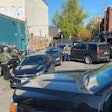The proposed shift would include the hiring of hundreds of agents and analysts as well as the creation of an Office of Intelligence, headed by a former CIA official, that would serve as a national clearinghouse for classified terrorism information, according to those familiar with Mueller's plans.
The changes are part of a broad reorganization in the wake of the Sept. 11 attacks and the Robert P. Hanssen spy scandal. They highlight a dramatic decline in clout for the FBI's Manhattan field office, which until Sept. 11 served as the hub of the bureau's terrorism cases.
It also underscores the extent to which Mueller intends to remake the FBI and consolidate power in the Washington headquarters, whose administrators have traditionally allowed field agents and their bosses to maintain control over their own investigations.
Attorney General John D. Ashcroft last fall took similar steps to limit the influence of the Manhattan U.S. attorney's office. He based a Sept. 11 task force in Washington and opened two key cases in Northern Virginia instead of in New York.
Mueller's proposals would require congressional approval, and officials said he hopes to present a formal version of the reorganization, including the "super squad," to Congress next month.
The proposals follow recent criticism on Capitol Hill over an apparent lack of coordination within the FBI on terrorism cases. Mueller recently came under fire from several Senate Democrats, who said the FBI did not respond aggressively enough to possible warning signs of the Sept. 11 attacks on New York and the Pentagon.
The FBI creates what it terms "super squads" to lead large-scale operations. Mueller and other top FBI officials believe that creating a specialized team in Washington will help the bureau spot patterns and connections among terrorist associates that might otherwise get lost within the bureaucracy, officials said.
For example, Mueller testified last week, the FBI never considered whether the case of alleged terrorist conspirator Zacarias Moussaoui, who was arrested in August at a Minnesota flight school, was connected to warnings from the Phoenix field office in July about Middle Easterners enrolled in flight training academies.
Officials concede a restructuring is not foolproof. For example, Hanssen spied for Moscow beneath the FBI's roof, undetected for nearly two decades even with a somewhat centralized counterintelligence operation.
But the plan already is creating concern among some of the FBI's powerful special agents-in-charge, or SACs, who command most of the FBI's 56 field offices, and some of the 11,000 agents who fear that traditional crime-fighting will be overshadowed by counterintelligence and counterterrorism goals.
Mueller and other FBI officials have stressed in recent months that nonterrorism investigations will continue to be pursued by the FBI, although not at the level that they have in the past.
The plan to centralize terrorism investigations would further heighten the stature of Dale Watson, the former counterterrorism chief who now oversees terrorism and intelligence operations within the FBI.
The FBI's New York City field office has been the bureau's preeminent terror unit. It ran investigations into the 1993 World Trade Center bombing and the 1998 East Africa embassy bombings, among many other cases, and has been the incubator for top officials such as Pat D'Amuro, the FBI's new counterterrorism chief.
Mueller has spoken with senators and other officials about the outlines of his proposed reorganization, but has not publicly divulged many details. The former prosecutor and Justice Department official has already replaced one-fourth of the FBI's senior executives since September and has dramatically restructured the top echelons of the bureau.
About 2,100 agents and 2,000 other employees are dedicated to counterterrorism cases, down from a peak of about 7,000 after the Sept. 11 attacks, officials said.
More than 1,600 new employees are expected to be hired over the next 18 months, most of whom will be dedicated to counterterrorism and counterintelligence cases, authorities said. The FBI is aggressively recruiting applicants fluent in Arabic and other Middle Eastern and South Asian languages.















